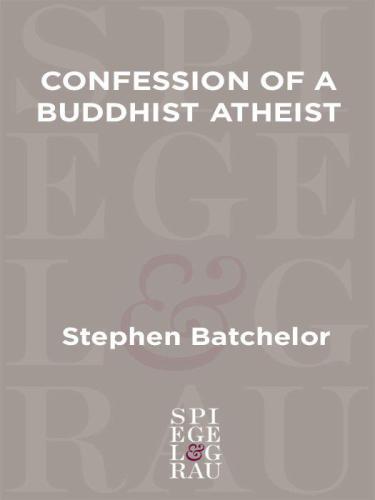
Confession of a Buddhist Atheist
کتاب های مرتبط
- اطلاعات
- نقد و بررسی
- دیدگاه کاربران
نقد و بررسی

February 8, 2010
Batchelor’s Buddhism Without Beliefs
(1997) described a “secular” approach to the Eastern philosophy stripped of doctrines such as karma and rebirth; how a young British monk ordained in the Tibetan tradition turned into a “Buddhist atheist” is revealed in this new book. On the dharma trail in India and Korea, and later as a lay resident at the nonsectarian Sharpham community in England, Batchelor was beset by doubts about traditional Buddhist teachings. Finally convinced that present-day forms of Buddhism have moved far beyond what founder Gotama had intended, Batchelor embarked on a study of the Pali canon (very early Buddhist texts) to find out what the Buddha’s original message might have been. Batchelor’s own “story of conversion” is woven effortlessly with his analysis of Buddhist teachings and a 2003 pilgrimage to Indian sites important in the Buddha’s life. He is candid about his disillusionments with institutionalized Buddhism without engaging in another “new atheist” broadside against religion. While Batchelor may exaggerate the novelty of his “Buddhism without beliefs” stance, this multifaceted account of one Buddhist’s search for enlightenment is richly absorbing.

January 1, 2010
Religious scholar and former monk Batchelor (Living with the Devil: A Meditation on Good and Evil, 2004, etc.) chronicles his four-decade journey through varieties of Buddhism.
The notion that a Buddhist can be an agnostic or atheist is not oxymoronic, of course. Buddhism requires no formal belief in a god or gods. It does, however, require other leaps of faith, including one that Batchelor admits to having had trouble grasping—namely, the acceptance of reincarnation, for"the entire edifice of traditional Buddhist thought stands or falls on the belief in rebirth." The author arrives at his discussion of reincarnation through a hard tour of duty in a highly intellectual school of Tibetan Buddhism that prizes the study of formal logic and debate, providing tools for a rationally based, constantly inquiring approach to religion. As the Buddha said,"Just as a goldsmith assays gold, by rubbing, cutting, and burning…so should you examine my words. Do not accept them just out of faith in me." Elsewhere Batchelor writes of his encounters with the Dalai Lama, who has been waging a quiet war against the Tibetan belief in evil spirits, but who has also long been engaged in schools of Tibetan Buddhist thought other than his own in a kind of ecumenical spirit. Batchelor provides smart commentary on various aspects of Buddhist belief of whatever school, including the well-known eightfold path guiding appropriate behavior,"a complex feedback loop that constantly needs to be renewed and restored." Seekers of truths large and small, no matter what their inclinations, will find that commentary valuable, especially the author's exhortation that belief is not enough—one also has to act and act in the right way.
A welcome contribution to Buddhist studies, joining essential modern books such as Rick Fields's How the Swans Came to the Lake (1980) and Robert Aitken's Taking the Path of Zen (1982).
(COPYRIGHT (2010) KIRKUS REVIEWS/NIELSEN BUSINESS MEDIA, INC. ALL RIGHTS RESERVED.)

April 1, 2010
Buddhism, at least in its more ascetic and scholarly forms, prescinds from the existence of God: whether or not you believe in God, you "can" become enlightened. Siddhartha Gautama, the Buddha, did not teach the existence of any kind of God. (Many Buddhists, however, do believe in a God or gods.) As Batchelor ("Buddhism Without Beliefs"), a former Buddhist monk, points out in his new memoir, central to the beliefs of Buddhists are doctrines of rebirth and of dharma (universal law of recompense for one's acts). These doctrines define Buddhism as a religion. Batchelor is a highly regarded scholar and writer on Buddhism who has extensively studied the "Pli Canon", which gives an authoritative account of Gautama's teachings; he finds to his surprise that Gautama did not teach rebirth or dharma and that consequently he did not teach that there was any final justice in the universe. VERDICT This carefully researched and thorough title may not be suitable for a casual reader seeking a basic introduction to Buddhism, but it is well worth the effort; recommended especially for academic libraries.James F. DeRoche, Alexandria, VA
Copyright 2010 Library Journal, LLC Used with permission.

























دیدگاه کاربران